Oct 2021 1st edition
Oct 2021 1st edition Londekile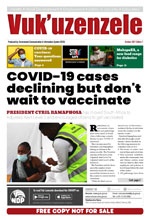
English PDF version
Translations
Afrikaans
isiNdebele
isiXhosa
isiZulu
Sepedi
Sesotho
Setswana
Siswati
Tshivenda
Xitsonga
A healthy diet is vital during pregnancy
A healthy diet is vital during pregnancy LondekileADSA spokesperson Cathy Day says high protein diets that increase ketone production are not recommended as the foetus has a limited ability to metabolise ketones.
Ketones are substances that your body makes when the cells in your body don't get enough blood sugar. “Energy restriction during pregnancy is not recommended and it is healthier for you to adopt a balanced diet with a good variety,” Day says.
What to eat
A good diet for a pregnant woman must contain two or more different food types. The National Department of Health (NDOH) advises that starchy foods should form part of most meals.
NDOH says fortified maize meal and bread provide extra vitamins and minerals and advises to include whole grains, as they contain fibre which helps with constipation.
The department says protein foods, such as fish or chicken should be eaten daily by an expectant mother.
Fish such as pilchards, sardines and salmon contain omega-3 fatty acids important in the development of a child’s brain.
The diet of a pregnant woman should include dark green leafy vegetables, yellow or orange coloured vegetables and fruit. Dry beans, split peas and soya should be consumed regularly and low fat milk or yoghurt should be eaten every day.
Exercising helps baby
Another way of staying healthy during pregnancy is exercise. Exercising while pregnant helps reduce some of the common symptoms associated with being pregnant.
Exercise can help improve one’s mood, helping mothers sleep better and promotes strength, muscle tone and endurance that may be helpful during labour.
Day says women who engage in 30 minutes or more of moderate exercise, most days of the week, have less medical and obstetric complications.
What to avoid when you’re pregnant
An expectant mother should avoid salty, oil-rich foods, and fizzy drinks because of their high sugar content.
“Smoking tops the list of what shouldn’t be going into a pregnant body. While it is debatable whether drinking a glass of wine is safe, many experts and governments around the world recommend the complete avoidance of alcohol,” says Day.
BRICS key to SA's growth
BRICS key to SA's growth Ursula
A year before the first democratic elections, President Nelson Mandela wrote an article in Foreign Policy magazine on the new South Africa’s future foreign policy.
Reflecting on the shifts in global alliances brought about by the end of the Cold War, he wrote that countries would have to “recast their nets” if they were to reap any benefit from international affairs.
Since the tectonic shift of 1994 when we made a decisive break with not just apartheid but the international relations outlook of its architects, South Africa’s foreign policy continues to be characterised by this “recasting the net”.
Our foreign policy priorities are regional political and economic integration, pursing African development, multilateral engagement and the promotion of democracy, peace and human rights.
To this end, we have forged strategic alliances with both the countries of the Global South and mutually beneficial cooperation with the countries of the North. 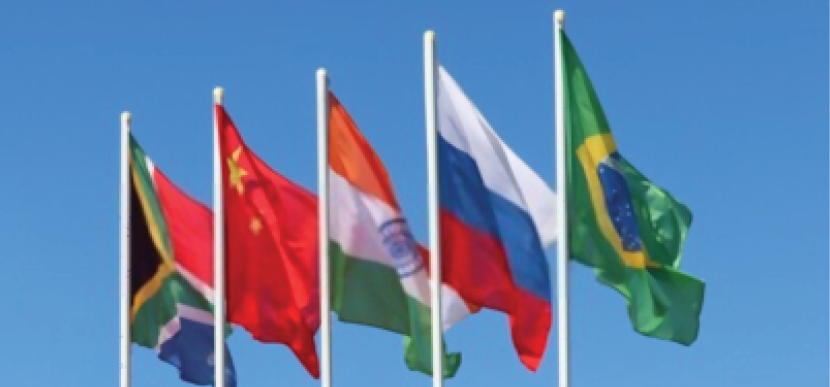
Joining the BRICS group of countries in 2010 was a milestone in our quest to advance our own national development priorities by forging stronger ties with the important emerging economies of Brazil, Russia, India and China.
Put into context, BRICS countries comprise roughly 41% of the world’s population and account for around 24% of global GDP and some 16% of global trade. We have reaped the benefits of membership of this important bloc, most notably in the area of economic cooperation.
Bilateral trade has grown, particularly with China and India, with commodity exports and manufactured goods imports featuring strongly. The BRICS countries continue to be important sources of foreign direct investment in key such as mining, automotive, transportation, clean energy, financial services and IT.
A 2018 review of our BRICS membership by professional services firm Deloitte noted that BRICS partners “invested three times more capital in the country compared to the seven years prior to 2011”. These investments and projects have in turn led to significant job creation.
Since the formation of the New Development Bank, whose regional office is located in Johannesburg, South Africa has been a beneficiary of financing and technical support for projects in transportation, clean energy, environmental protection, water infrastructure and greenhouse gas emissions reduction.
Since the outbreak of the COVID-19 pandemic, South Africa has received $2 billion in funding from the New Development Bank under the COVID-19 Emergency Loan Programme to fight the pandemic and to support our economic recovery.
There has also been substantial cooperation with our BRICS partners in securing personal protective equipment and cooperation around vaccine access and distribution.
We recently participated in the 13th BRICS Summit, where BRICS countries agreed to deepen cooperation to fight COVID-19 and mobilise the political support and financial resources needed to respond to future pandemic preparedness.
This includes the establishment of a virtual BRICS Vaccine Research and Development Centre and a BRICS Integrated Early Warning System to forecast future outbreaks of infectious diseases.
Another important area of agreement was on mutual recognition of national documents of vaccination and systems of COVID-19 testing – something that will be vital to cross-border travel in the future.
The concept of mutually beneficial cooperation will be particularly important in the global economic recovery, where unequal development means that some countries will bounce back quickly, while others will lag behind.
In support of economic recovery, BRICS partners agreed to strengthen collaboration in catalytic sectors such as energy, IT, science, technology and innovation, agriculture and the green economy. These are all important sectors identified in our Economic Reconstruction and Recovery Plan announced last year.
Cooperation with other BRICS countries, particularly in the field of innovation research, will help to accelerate our country’s industrialisation and help us meet our Fourth Industrial Revolution aspirations.
In this regard, discussions were held around the creation of formal BRICS platforms to share best practice, knowledge and expertise, including the use of open source technology platforms.
The BRICS partners agreed that developing countries need assistance to achieve the UN Sustainable Development Goals, and that donor countries should honour their commitments in this regard. This is particularly important within the context of climate action.
Like most countries, South Africa seeks to move towards a low-carbon development path that is inclusive, sustainable and that takes into account our status as a developing country. The BRICS Energy Research Cooperation Platform will be valuable as we move to diversify our energy sources.
In the 11 years since we joined BRICS, our membership has substantially advanced our national interest. Being a member of BRICS has enhanced our position as an important emerging economy.
It has given us access to policy and technical expertise of larger and established economies, as well as access to the support of the National Development Bank.
It has strengthened our activism on the global stage, particularly around reform of multilateral institutions.
We have benefitted from being part of a collective voice striving to advance a world order based on mutual respect and the equal sovereignty of nations.
BRICS is of immense strategic importance to our country and will continue to be so for some time to come.
COVID-19 cases declining but don't wait to vaccinate
COVID-19 cases declining but don't wait to vaccinate UrsulaPresident Cyril Ramaphosa has moved South Africa to Adjusted Alert Level 2 and encouraged citizens to get vaccinated. 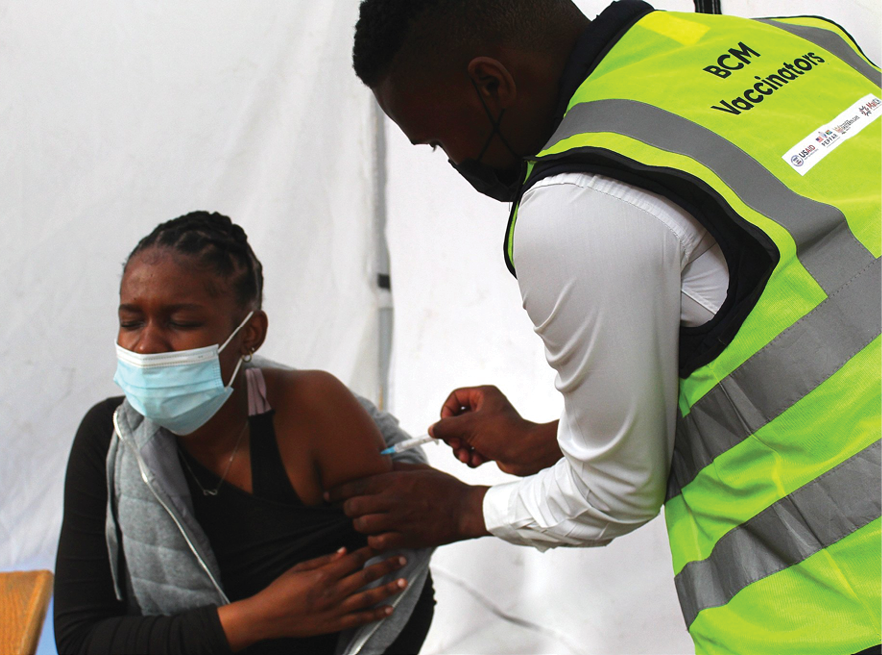
Restrictions on movements of people and gatherings have been eased in South Africa following a steady decline in new COVID-19 infections.
This was announced by President Cyril Ramaphosa during an address to the nation recently. The President announced the move from Adjusted Alert Level 3 to Adjusted Alert Level 2 of the lockdown.
The President said the decrease in the number of new infections across the country spurred the decision to move the country to a lower level of restrictions.
“While the third wave is not yet over, we have seen a sustained decline in infections across the country over the last few weeks.”
President Ramaphosa said that after thorough consultations, Cabinet decided on the following measures for Adjusted Alert Level 2:
- The hours of curfew now start at 11pm and end at 4am.
- Non-essential establishments like restaurants, bars and fitness centres must close by 10pm to allow their employees and patrons to travel home before the start of the curfew.
- All gatherings have been limited to a maximum of 250 people indoors and 500 people outdoors.
- Where the venue is too small to accommodate these numbers with appropriate social distancing, then no more than 50% of the capacity of the venue may be used.
- The sale of alcohol from retail outlets for off-site consumption is now permitted between 10am and 6pm from Monday to Friday.
- Alcohol sales for on-site consumption is permitted as per licence conditions up to 10pm.
The President said the measures will be reviewed and warned that infections in the Free State and Northern Cape remain a concern.
Government will be focusing its efforts on these provinces to understand what was driving infections and measures that need to be taken to bring down the number of infections.
Vaccinating the nation
On the vaccine front, President Ramaphosa announced that the country has secured enough COVID-19 vaccines for the entire adult population of South Africa.
He said that although securing the vaccine doses is an important step; citizens still need to come forward to get the jab.
“We are increasing the pace of vaccination and ensuring that we reach those that are most vulnerable to serious illness. While everyone aged 18 years and older is eligible to be vaccinated, we are concentrating our efforts and resources on those over 60 years of age and those with co-morbidities.”
The President added that vaccines remain the strongest source of protection against severe illness and encouraged all unvaccinated people in South Africa to get the jab at one of the thousands of vaccination sites in the country.
“There is now overwhelming evidence from hundreds of countries that vaccines are safe and provide strong protection. We have taken steps to make it easier for people to access vaccination wherever they are.
“We now have more than 3 000 public and private vaccination sites across the country, and most private sites will vaccinate any member of the public for free whether you have health insurance or not.”
Local government elections
With the country set to elect new leadership for more than 250 municipalities on 1 November 2021, President Ramaphosa said discussions with political parties were held to stress the importance of COVID-19 health protocols and adherence to the National State of Disaster regulations.
“It is vital that as we undertake this great democratic exercise, we do everything within our means to prevent a resurgence of COVID-19 infections.
“At the same time, we need to ensure that the pandemic does not limit the ability of all South Africans to freely exercise their democratic right to elect their local councillors.” SAnews.gov.za
For the latest COVID-19 vaccination sites visit: https://sacoronavirus.co.za/active-vaccination-sites/
COVID-19 vaccines: Your questions answered
COVID-19 vaccines: Your questions answered UrsulaWith South Africa’s Coronavirus Disease (COVID-19) vaccination programme now in full swing, Vuk’uzenzele has put together information from the Department of Health to help answer some common questions about the vaccine. 
Q: Can the vaccine cause COVID-19 or make me test positive?
A: None of the vaccines used in South Africa contain the live virus that causes COVID-19. It does not cause the virus and you will not test positive after receiving the vaccine.
Q: Is it true that there’s a microchip in the vaccines, that tracks people’s movements?
A: There is no microchip or tracking device in the vaccines. Vaccine manufacturers are required to declare the ingredients to the South African Health Products Regulatory Authority (SAHPRA) before the vaccine is approved for use.
Q: I have heard that vaccines have the mark of the Beast – 666. Is this true?
A: Vaccines have no connection with any religious organisations and cannot be infused with spirits, demons or other abstract ingredients.
Q: Should I get vaccinated if I am pregnant?
A: A pregnant woman is more likely to get ill from COVID-19. Getting vaccinated can prevent a pregnant woman from being severely ill.
Q: Should I stop breast feeding to get vaccinated?
A: The World Health Organisation and the Department of Health do not recommend stopping breastfeeding in order to get vaccinated. Vaccines are safe for use in breastfeeding mothers.
Q: Can I get a vaccine soon after being infected with COVID-19?
A: Anyone who has been infected with COVID-19 must wait at least 30 days from when their symptoms stop.
Q: I have COVID-19 symptoms, is it safe to get vaccinated?
A: You should not get the vaccine if you have symptoms of COVID-19. You should rather be tested.
Q: Can I get my second dose of the Pfizer vaccine earlier than 42 days after my first shot.
A: You are only eligible for your second jab after 42 days.
Q: Do I need to be vaccinated if I have recovered from COVID-19? Can my body not fight the disease on its own, without suffering the side effects of the vaccine?
A: Evidence shows that your body’s response, when you are sick from COVID-19, is much weaker and shorter than the response to the vaccine. Getting the vaccine will give you a much stronger and longer-lasting immune response. The side effects of the vaccine are mild and do not last more than a day or two, while getting sick from COVID-19 can cause hospitalisation or death.
Q: Can people with chronic diseases, such as high blood pressure, get the vaccine?
A: People with chronic diseases are at higher risk of getting severe COVID-19. They will therefore benefit the most from getting the vaccine.
Q: If I previously had an allergic reaction to medication or a vaccine should I get the COVID-19 vaccine?
A: Anyone with a history of allergic reactions to other vaccines or medicines should first speak to their health practitioner.
Q: How dangerous is an allergic reaction to the vaccine?
A: Severe allergic reactions are rare. An allergic reaction usually happens within seconds or minutes after getting the vaccine. This is why all people must wait in the observation area for 15 minutes after their vaccine.
Q: Is it safe to get the vaccine if you are allergic to eggs?
A: Yes. None of the COVID-19 vaccines have any egg proteins.
Q: I have heard of elderly people dying shortly after getting the vaccine. Is the vaccine safe for the elderly?
A: The vaccine is safe and highly effective to prevent severe COVID-19 disease and death. Through the use of the vaccine, there has been a huge drop in COVID-19 deaths in the elderly in several countries.
Q: Why do some people still get COVID-19 within two weeks of getting the vaccine?
A: You are only fully vaccinated 30 days after getting the Johnson & Johnson vaccine or two weeks after the second dose of the Pfizer vaccine. If you are exposed to the virus before you are fully vaccinated, you may get the disease.
Q: Does the vaccine completely prevent COVID-19 infection?
A: No. Even after you are fully vaccinated you can still get COVID-19. However, the vaccine reduces risk of severe COVID-19 infection, hospitalisation and death.
For more information go to https://sacoronavirus.co.za
Frank Molongwana is driving success
Frank Molongwana is driving success vuyelwanFrank Molongwana (25) took a leap of faith when he quit his job at a big courier company to launch his own business, Frank Couriers.
He initially used taxis to deliver parcels to clients, as he couldn’t afford to buy a delivery vehicle.
“I started Frank Couriers with no money.
"I used skills gained from previous employment. I worked at a warehouse, under short-term contracts, before I started working in the logistics field,” he says. 
Molongwana, from Ga-Matlala in Limpopo, registered his company in January 2020, but it only started operating in May during the Coronavirus Disease hard lockdown. “I used taxis to deliver for a few months, then I contracted car owners for local deliveries around Gauteng,” he says.
Frank Couriers delivers parcels door-to-door, within three to five days. It has partnered with other local courier companies for Gauteng deliveries, in areas its vehicles cannot reach.
The business now has its own truck and has contracted five bakkie car owners in Gauteng for local deliveries.
Molongwana says he is proud to play a part in growing South Africa’s economy and to be in a position to create jobs.
“There’s a high unemployment rate in the country. My aim is to create more employment for young South Africans and empower them with skills in the logistics field, so that they can also start their own courier businesses,” he says.
Drawing from his experience in starting a business, Molongwana advises aspiring entrepreneurs to start with what they have and where they are, before thinking of going big.
“A courier service does not require a lot of capital to start. Those interested in this business need to choose the correct equipment for a courier service.
"This would be, for example, a truck or bakkie, with a courier canopy, and a cellphone with GPS. With these you are good to start,” he says.
Molongwana plans to grow his company and expand beyond South Africa’s borders.
For more information, visit www.frankcouriers.com
Funding relief for Gauteng SMMEs
Funding relief for Gauteng SMMEs LondekileThe Gauteng Rebuilding Fund has set aside R100 million for SMMEs in distress.
The Gauteng Economic Development Department and Gauteng Enterprise Propeller (GEP) have opened applications for relief funds to boost small, medium and micro enterprises (SMMEs) in the province.
The Gauteng Rebuilding Fund has set aside a R100 million for SMMEs in distress as result of July’s civil unrest and the Coronavirus Disease pandemic.
 According to the department, R50 million was raised by the Gauteng government and R50 million through partnerships with the Industrial Development Corporation.
According to the department, R50 million was raised by the Gauteng government and R50 million through partnerships with the Industrial Development Corporation.
Gauteng Economic Development MEC Parks Tau says the damaged caused by the unrest had a negative impact on small businesses.
“Small enterprises suffered the most, with some losing their entire stock and infrastructure. In Gauteng, over 18 200 people lost their jobs… With 48% of SMMEs uninsured, it will be difficult for them to return to business soon.
“The Gauteng Rebuilding Fund is the first step towards bringing economic relief to informal enterprises which play a critical role in our township economy,” says MEC Tau.
He explains that the fund has been modelled as a loan or grant blend, to help businesses cover rebuilding costs and repairs and replace infrastructure, inventory, equipment and critical supplies. It will also cover increased business security and employee costs.
“Businesses that have applied for insurance relief through the SA Special Risks Insurance Association or any other insurance are not eligible for assistance through the fund.
“Businesses that want financing for normal expansions or non-operational expenditure, such as bonuses or new enterprises, are also not eligible,” says MEC Tau.
Only businesses that are based in Gauteng and can prove that they will be able to pay back the loan component of the fund can apply. Businesses must also provide proof that they were trading before the civil unrest.
GEP CEO Saki Zamxaka says there is no closing date for applications, as they will be accepted until the funds are exhausted. “The loan or grant blend will be capped at R1 million for formal SMMEs and R50 000 for informal businesses.”
Qualifying businesses can apply online or download the application form from the GEP website at www.gep.co.za, visit their regional GEP office or call 087 057 2000.
Get your jabs, encourage family men
Get your jabs, encourage family men UrsulaMen, who are slower to get their COVID-19 vaccines than women, need to roll up their sleeves and help protect their families. 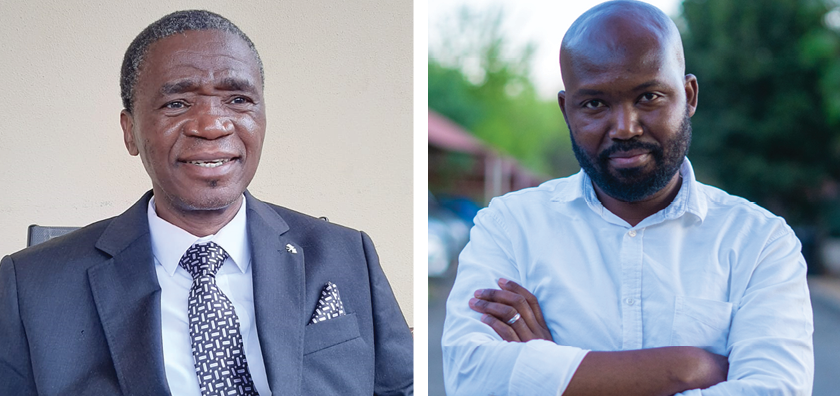
Pro-vaccine family men are calling on their peers to get vaccinated against the Coronavirus Disease (COVID-19) to protect the lives of their families and friends.
Health Minister Joe Phaahla says the number of men getting vaccinated is worryingly low when compared with that of women. He believes this could be because of vaccine misinformation, including the exaggeration of side effects.
“COVID-19 vaccines are safe and effective,” says the Minister.
Pastor Dumisani Mthembu, of Pinetown Faith Centre in Durban, KwaZulu-Natal says people must beware of peddlers of misinformation, who use the Bible to discourage people from getting vaccinated.
“We have always trusted our doctors and scientists, who have helped us with so many health issues. There is no doctor who would go to work with the intention to kill people. They are doing all of this work to save humanity from this virus,” he says.
Mthembu says that elders need to teach the young that vaccines have been used for years to protect people against dangerous viruses, such as polio, smallpox, measles, mumps, and rubella.
Mthembu had his first Pfizer jab in May and his second in July. Like most people, he had only minor side effects. He says he had a mild headache, but within three days was back to normal. No side effects were experienced after his second jab.
Pastor Mthembu continues to encourage his congregants to vaccinate so that life – and all church activities – can get back to normal.
Protecting families
Husband and father Kenny Mdluli (34) from Midrand says he was once sceptical of the vaccine, but his wife Pearl convinced him to get vaccinated in September to help keep his family safe.
“My mother had been in and out of hospital and I was driving her there and back. I worry about her, so I had to vaccinate.’’
He adds that it was also important to him to get vaccinated so that he protects the rest of his family, which includes his seven year-old daughter and his wife.
For detailed information about the vaccination programme or your nearest vaccination site, visit www.sacoronavirus.co.za
Learning about IP and legal rights
Learning about IP and legal rights vuyelwanGovernment Communication and Information System, in collaboration with the National Intellectual Property Management Office (NIPMO) – a specialised service delivery unit within the National Department of Science and Innovation – recently held a webinar about intellectual property (IP) and the Intellectual Property Rights (IPR) Act.
NIPMO’s Jetane Charsley explained that the National Development Plan describes innovation as process in which individuals and organisations transform their ideas into new products, processes and services to advance, compete and differentiate themselves successfully in the marketplace.
“These ideas are your creation of the mind and can be referred to as your IP, which can be protected by law,” she said.
IP can be divided into two categories - IP, which includes inventions, designs, plant varieties and marks or logos; and copyright, which refers to literary and artistic works, music, films and computer programmes. 
Innovation and new knowledge contributes between 50% to 80% to a country’s economic growth. While innovation is not the only way to ensure economic growth, it remains a significant and developmental catalyst.
“Innovation has the potential to support economic growth, employment and the creation of livelihoods at grassroots level, and improve performance and service delivery.
Together, these results of innovation have the potential to shift a country’s development trajectory and change citizens’ lives,” she added.
The benefits of IP
Mantwa Kgarume, also from NIPMO, explained IP rights and their benefits. IP rights are given by the State, to the creator, over their creations, she said.
“IP rights are given as a reward for creativity to the creator, for a limited period, to prevent others from making, using and copying their creation without permission.”
For example, if someone has their new product patented, they own the legal right to make the product for 20 years. This means that no one else is allowed to make the same product during that time.
“For copyright, for literary and artistic works, for example, IP rights last for duration of your lifetime, plus 50 years after death,” she said.
For individuals, the benefits of IP include:
- Providing a solution to a problem.
- Improving the quality of life.
- Creating jobs, thereby reducing the unemployment rate, alleviating poverty, reducing crime and growing the country’s economy.
- Encouraging society to be innovative.
The benefits for companies include:
- Giving a company a competitive advantage over its competitors.
- Enhancing company value.
- Pledging its collateral for a loan or financing.
- Being a role player in merges and acquisitions of other companies.
The IPR Act
NIPMO’s Lungelwa Kula discussed the Intellectual Property Rights Act, explaining that its objectives are to identify, protect, utilise and commercialise IP from publicly financed research and development for the country’s benefit.
The Act applies to all recipients of public funds that use the funds to conduct research and development, including higher learning institutions, science councils, state-owned enterprises, individuals and companies.
NIPMO, in partnership with the Companies and Intellectual Property Commission and the World IP Organisation, provide technology and innovation support centres to stimulate innovation and economic growth.
The centres provide access to online patent and non-patent resources and IP. It offers assistance in searching and retrieving technology information; training in database research; on-demand searches; monitoring technology and competitors; and basic information on industrial property laws, management and strategy and technology commercialisation and marketing.
WIPO Summer School
The World Intellectual Property Organisation Summer School on IP and the transfer of technology takes place annually for two weeks. This year, it is being held from 23 November to 3 December.
Thirteen Summer Schools take place across the globe, targeting senior students, young professionals and government officials to enhance their IP knowledge and learn how IP should be transferred into society to make an impact.
While this year’s enrolments have already closed, it was the first year that school attendance was free of charge.
For more information about IP, the IPR Act and how to enrol for next year’s WIPO Summer School, visit www.nipmo.dst.gov.za
Letlhogonolo Motseeng's sizzling chicken is moja!
Letlhogonolo Motseeng's sizzling chicken is moja! LondekileLetlhogonolo Motseeng (34) went from selling grilled chicken feet and gizzards outside shebeens, as a boy, to owning Moja Chicken, with six franchises across the country.
Motseeng, from Taung in North West, says getting it right and winning in business comes from being involved in his grandmother’s small business. She owned chickens and it was Motseeng’s responsibility to feed them.
“I started selling from the age of 11, forced by the circumstances at home.
"I was trying to help my grandmother. I sold sweets and, as I grew older, I sold t-shirts, had a food stall and public phone container and did events. I have always been selling,” he says.
After matric, Motseeng worked for various companies.
He wanted to learn skills that he could use effectively in future.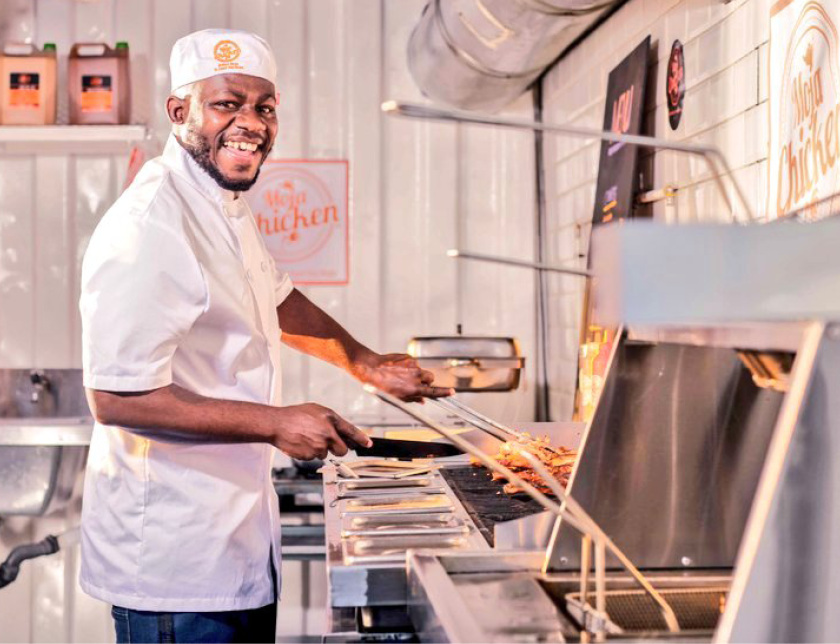
He worked in marketing, sales and consulting. While at his day job, he also had ‘side hustles’ and, in 2018, came up with the idea of Moja Chicken.
“I saved money and in 2019 decided to quit my job of seven years. I used my savings and provident fund to start the business,” he says.
Motseeng opened the first Moja Chicken outlet in September that year. Apart from his childhood experience with chickens, he studied the market and understood what consumers wanted.
“South Africa is one of the biggest chicken consumers in the world. Chicken is the most affordable meat here, so I understood that the market was big enough.
"I took chicken dust – township-style – and gave it flavours. This is what I sell at Moja Chicken,” he explains.
Moja Chicken, which was first opened in Soweto, today has six franchises across Gauteng, KwaZulu-Natal, Limpopo, Mpumalanga and Northern Cape. Two more franchises will open soon.
Motseeng says the first phase was to establish the franchise in townships. Now he wants to open Moja Chicken in suburbs and at taxi ranks.
“I strongly believe in the township economy. The name Moja means awesome, delicious, lekker. It is one of the biggest township lingos across South Africa,” he says.
Creating employment
Motseeng, who is driven by job creation and empowerment, has already employed 40 people. This, he says, warms his heart.
“Among the staff are five people from historically disadvantaged backgrounds. I have made them permanent employees and aim to grow this number in the near future.”
Motseeng was selected by the National Youth Development Agency as one of its trailblazers for 2021, which recognises and celebrates youth who make a difference in their communities.
“It came as a shock and the award is something big for my career. I continue to inspire many young entrepreneurs out there because I believe in making a difference in society,” he says.
How to start a franchise?
To start a franchise, there are compliance requirements one has to fulfil. The main requirement is for the company to be registered in the country and be compliant with the South African Revenue Service. The business will then need to be registered with the right associations.
“If you are in the food industry, you definitely have to be registered with the Franchise Association of South Africa and the Restaurant Association of South Africa,” says Motseeng.
Like any other business, it is best to involve attorneys. “Get a proper legal franchise agreement. You can get an attorney who works in that industry to take you through the paperwork and ensure everything is above board,” he says.
As a franchise, you will need to own the products. Motseeng also owns the sauces and spices that are used in Moja Chicken outlets. He also advises marketing the business well, using various platforms to reach the targeted market.
For more information, visit www.mojachicken.co.za
Let’s protect our children
Let’s protect our children UrsulaSocial Development Month is observed annually in October to mark our nation’s commitment to caring for the most vulnerable in society, including children.
While the Department of Social Development (DSD) is committed to promoting and protecting children’s rights, violence against children is increasing at an alarming rate.
“This is despite all efforts in advancing the care and protection of children,” says the department’s spokesperson Lumka Oliphant.
Nearly 130 000 babies were delivered by girls aged 10 to 19 in South African public health facilities in 2019. This figure increased to 136 386 deliveries for girls in the same age cohort in 2020, the Department of Basic Education (DBE) told Parliament in September.
The sharp increase in teenage pregnancies coincided with a surge in reported gender-based violence (GBV) cases during the 2020 hard lockdown, when learners were not physically at school, said the DBE’s Director-General Granville Whittle.
“There was a significant increase in reported cases of violence, rape, child abuse, neglect and exploitation during the COVID-19 hard lockdown restrictions, as per statistics provided by Childline South Africa and the 24/7 crisis line,” says Oliphant.
Oliphant stresses that everyone has a responsibility to report all suspected cases of child abuse. “Community members need to be educated about the laws that protect children and their responsibility to report child abuse to the police and social workers.”
One of these laws refers to statutory rape. While rape is when sexual intercourse occurs without consent, statutory rape occurs when a person engages in sexual intercourse with a child under the age of 16, even if the child gave consent.
While a person under the age of 18 is still considered a child in South Africa, the age of consent is 16.
Children’s safety compromised
Oliphant says the lockdowns disrupted children’s routines and social support systems, thus heightening multiple risk factors and vulnerabilities. Parents became unemployed, putting more stress on them.
“In some instances, this compromised children’s safety and protection.”
COVID-19 stigma and discrimination also made children more vulnerable and contributed to psychosocial distress. Their risk for sexual abuse and exploitation was also made worse by the use of online platforms.
“As children used more online platforms for education they were exposed to the risk of online perpetrators, who recruit and groom them for online sexual abuse and exploitation,” says Oliphant.
Prevent abuse
The DSD continues to create awareness and mobilise communities to protect children and has implemented numerous programmes to do so, including the 365 Days Child Protection Programme of Action.
Prior to lockdown, the DSD put prevention programmes in place, targeting children aged 10 to 14 and those aged 15 to 24. “Social behaviour change programmes targeting men and boys, interfaith organisations and traditional leaders were also established,” says Oliphant.
Suspected child abuse can be reported to Childline (dial 116 from your cellphone), SAPS (0800 10111) and the GBV Command Centre (0800 428 428).
Libby app brings reading home
Libby app brings reading home LondekileBook clubs in the Western Cape are excited about the new online reading service in the province, saying it will promote a culture of reading in many communities.
The Western Cape Library Service recently launched an e-book service, which will bring e-books and audiobooks to library users across the province.
Library patrons can borrow books from the comfort of their homes using the new Libby app. E-books will be available in isiXhosa, English and Afrikaans.
The initiative comes after the Department of Basic Education’s launch of the Reading for Meaning Programme last year. For many years, it has been a concern that many primary school children read without understanding a book’s content.
The founder of Active Citizens Everyday Book Club, Mondeka Mabibini, from Philippi, says accessing books online will help children from her community and neighbouring Samora Machel to read from the devices they are already hooked on.
“Most of the time you find that children have smartphones and have access to the internet, so they will now be able to use their devices educationally. This will help them improve their reading skills, without going to the library,” she says.
Mabibini adds that reading is important because it helps grow a child’s mind.
“When reading, a child is able to imagine something without having seen it.
"A reading child grows up to be a sympathetic child. While reading, they develop emotions about the characters in the book. Reading also helps improve one’s knowledge.”
Mabibini says to get children to read with meaning, parents need to use strategies to get children to think as they read. When children read, parents must ask them to retell the story to test their understanding.
The app can be downloaded from Google Play Store or Apple iStore.
Make sure you have a will!
Make sure you have a will! LondekileIf you don’t have a valid will, you will have no control over who inherits your assets when you die. This might lead to people inheriting your money or assets, even if you didn’t want them to.
If a person dies without making a will, the assets that they owned will be distributed in terms of the Intestate Succession Act, to the people who must rightfully inherit them.
The Act sets out rules of how the estate must be distributed. It goes to close relatives first, in a specific order:
- If you are survived by only a spouse, the spouse will inherit the entire estate.
- If you don’t have a spouse and are only survived by your children, they will inherit the estate in equal shares.
- If you are survived by a spouse and children, the spouse will receive a child’s share or R250 000, whichever is greater, and the children share the balance. For example, if the estate is worth R2 million and the deceased is survived by a spouse and three children, a child’s share amounts is R500 000. The child’s share is calculated by dividing the value by four.
- If you have no spouse or children, but both parents are alive, they will inherit the estate in equal shares. If one parent is dead, but left siblings, the surviving parent will inherit half of the estate and the deceased parent’s descendants will receive the other half.
- If both of the deceased’s parents have died, but they left descendants, the estate is split into equal parts.
- If the deceased does not leave a spouse, descendants, parents or parents’ descendants, the nearest blood relation will inherit the entire estate.
- Finally, if the deceased is not survived by any relative, the State will inherit the proceeds of the estate.
In addition to the above, a child born out of wedlock can inherit from both blood relations; and an adopted child is deemed as a descendant of his adoptive parent or parents.
When is a will valid?
A will is only valid when made by a person 16 or older, and must meet the following requirements:
- It must be in writing, and your signature must appear on every page and at the end.
- It must be signed in the presence of two or more competent witnesses. Any person 14 and above can be a witness. An heir can’t be a witness.
- You must include full details of your assets and who you want to leave them to, including their names and details.
- You must nominate a person to manage your estate (the executer). This person can’t be an heir.
- You must state what should happen to a minor beneficiary’s inheritance.
- If you are the sole guardian of a minor child, indicate who should be appointed as the child’s guardian.
- You must ensure the original signed will is kept safe, because a copy is not valid.
Information supplied by the Office of the Ombud for Financial Services Providers as a member of the National Consumer Financial Education Committee.
Marie Roberts turns 99 after beating COVID-19 twice
Marie Roberts turns 99 after beating COVID-19 twice UrsulaMarie Roberts turns 99 after beating COVID-19 twice 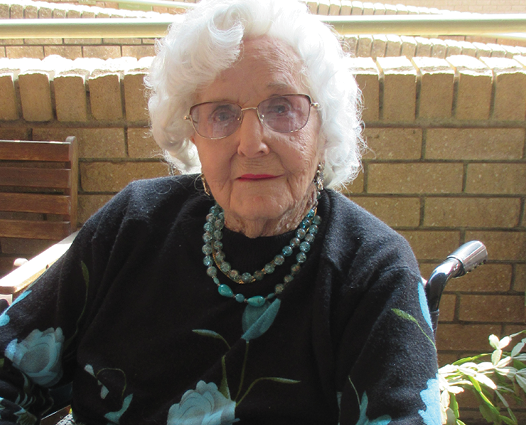
Marie Roberts recently celebrated her 99th birthday, but has also stopped the Coronavirus Disease (COVID-19) in its tracks… twice!
Aunty Marie, as she is fondly called at Rand Aid Ron Smith Care Centre (RSCC) where she is a resident, contracted COVID-19 in the first and third waves.
Roberts contracted COVID-19 prior to being vaccinated, but has since received both of her vaccine doses.
"I can't remember much about the first time I had COVID-19 because I was on full oxygen, day and night, and on a drip.
“The second time I had it, I was in isolation. I think it’s wonderful that I am still here after having COVID-19 twice. I don’t know how I did it,” she says.
Leanie Bessinger, Charge Professional Nurse at RSCC, says Roberts did not have many symptoms during her second infection.
“Aunty Marie has a very positive outlook on life and a very sharp sense of humour, which helped her through both her COVID-19 experiences,” she adds.
Robert encourages people to get the COVID-19 vaccine. “It saves lives. Also, if you are infected with COVID-19, you might not die, but the person you spread it to could die. It’s very important to get the vaccine to stop the spread of the virus.”
A full life
Robert says she has been blessed to live a full life.
She was born in 1922, in the small town of De Putten near Zeerust.
“My father was a school teacher who came to South Africa from Scotland. I grew up with six sisters and two brothers, and attended a farm school for the first 10 years of my life – which is where I learnt to speak Tswana. We used to go to school on a donkey cart,” recalls Roberts.
In 1932, her family moved to Johannesburg where she attended Commercial High School.
She met her husband Lawrence at the roller rink in Malvern.
The couple had two sons, seven grandchildren and five great grandchildren. “We shared a love of music. I played classical and jazz on our baby grand piano, and my husband played the drums in a band. I can listen to music for hours,” says Roberts.
She adds that her faith was the most important thing to her throughout her life. "I have been blessed to be part of a big, loving family,” she says.
MukapuZA, a new food range for diabetics
MukapuZA, a new food range for diabetics vuyelwanVhutshilo Netshiongolwe has created an organic, plant-based cereal that is suitable for diabetics.
Netshiongolwe, from Limpopo, says the idea was sparked after watching his grandmother battle with type 2 diabetes, for over 35 years, and struggle to access proper medication.
Last year, Netshiongolwe finally put his product, MukapuZA, on the market. He says this was after a long trial and error process to create the affordable cereal. 
“I wanted the cereal to minimise my grandmother’s insulin resistance, yet taste as good as any other food. The name Mukapu is derived from a Tshivenda word that refers to soft porridge,” says Netshiongolwe.
The certified aircraft turner machinist invested time in researching indigenous knowledge systems and how these can be used to manage diabetes.
Netshiongolwe says diabetes is a huge problem. His vision is to be a pioneer of personalised dietary meal replacements that can help in managing and ultimately reverse insulin resistance completely. This would substantially lower the cost of diabetes healthcare.
“Through the support of friends and family, I was able to fund the business personally. I have rented a house, which was converted into a processing plant, where we do our own production and packaging. "We also source all our ingredients locally, which supports local businesses.”
The company has grown to now also produce instant cereals, crunchy granola and sweet potato post-workout flakes.
Netshiongolwe says his products are also receiving interest from those who do not have diabetes.
Interest is slowly picking up, especially in urban areas where many people are fitness enthusiasts, food and health conscious and believe in weight management.
“We now deliver nationwide through third party courier services, and employ four permanent staff members,” Netshiongolwe says.
MukapuZA is available online at www.mukapuza.co.za. Alternatively, send a WhatsApp to +27 81 277 0987.
New machine certifies documents
New machine certifies documents vuyelwanTwo innovators have designed a self-service certifying document machine that is set to make standing in long queues to certify documents a thing of the past.
Thabang Mamantsebe and Pule Maake, from Ekurhuleni in Gauteng, are the owners of E-Certify, a machine they invented to certify documents using biometric scans (using fingerprints or facial features to identify someone).
Mamantsebe says the main goal of E-Certify is to assist government, communities, human resources management departments and the private sector to make sure that the documents they receive are valid. 
“I thought of the idea in 2014 and presented it to my partner Maake. He took me by surprise and said we are doing this project. Since then, he has been my right-hand man,” says Mamantsebe.
In 2015, he tried to have the machine patented, but did not succeed. “In 2017, Maake encouraged me to register the company with Companies and Intellectual Property Commission. I did a second provisional patent and we finally succeeded.”
E-Certify is now registered and patented under the Thabi T Group (Pty) Ltd.
The duo approached the Design Department at the Vaal University of Technology Southern Gauteng Science and Technology Park (VUTSGSTP) to help them fine tune their design.
They were introduced to Tebogo Kekana, a product designer at VUTSGSTP, who gave them input on how the machine could be improved.
“Kekana also informed us about the Technology Innovation Agency (TIA) and advised us to apply for funding. We have since received assistance from the agency. We are very thankful to Kekana, TIA and the VUTSGSTP team for their help and guidance,” says Mamantsebe.
The machine is easy to use and will reduce long queues at police stations, Home Affairs offices, the South African Post Office and border gates.
“It scans original documents to verify them and then certifies the copies. Ideally, it will link to the Department of Home Affairs, to validate identity.
“It will also ideally be linked to government departments that need to authenticate documents.”
Mamantsebe says he is in discussions with various government departments and state-owned entities for possible partnerships with E-Certify.
To apply for funding from TIA, call 012 472 2700 or apply online at www.tia.org.za/funding-instruments.
No link between COVID-19 jabs and deaths
No link between COVID-19 jabs and deaths UrsulaNo South African has died after being vaccinated for the Coronavirus Disease (COVID-19).
This was according to the National Immunisation Safety Expert Committee (NISEC) Chairperson, Professor Hannelie Meyer.
Professor Meyer was speaking during a webinar on self-reporting of side effects or adverse events.
Meyer said the South African Health Products Regulatory Authority (SAHPRA) and NISEC received 88 reports of death for those who have received a COVID-19 vaccine between 17 May and 31 August this year. 
This accounts for 0.0007% of the 12 166 043 vaccines that had been administered by the end of August.
She says 46 deaths are still under investigation, while 40 have been examined and the causality assessed.
“Amongst the 40 that have been causality assessed, none of those were related to any of the COVID-19 vaccines we are using in South Africa.”
Causality assessment is defined as a procedure to determine if there is a cause-and-effect relationship between medicine and the occurrence of an adverse event, with no other factor intervening in the process.
Meyer explained that 13 people died due to COVID-19 disease.
“They had already incubated COVID-19 at the time of vaccination or contracted COVID-19 shortly after being vaccinated before they could mount an adequate immune response.”
Meyer added that the non-COVID-19 related deaths happened “coincidentally” after vaccination.
She said that the majority of the people that had died had multiple comorbidities including hypertension, heart disease, tuberculosis, obesity and so on.
“They die coincidentally through vaccination because of comorbidities.”
She assured the public that all the data is considered by the experts before any conclusion, adding that there are six unclassified cases due to insufficient information.
“Meyer also pointed out that government has been vaccinating the elderly population, most of whom suffer from chronic conditions.
“What we also need to remember is that the main goal is to protect these people from severe illness, to protect everybody from severe illness, especially the elderly population. However, they are at a higher risk of dying from COVID-19.”
She advised senior citizens to get vaccinated as soon as possible.– SAnews.gov.za
For more information about reporting adverse events after vaccination logon to http://aefireporting.sahpra.org.za
Nokuthula Mchunu is flying high
Nokuthula Mchunu is flying high vuyelwanA former airport cleaner is on her way to realising her dream of becoming a pilot.
A former airport cleaner, who is now a student pilot at Focus Air Flight School in Durban, encourages people from previously marginalised groups to join the aviation industry.
Nokuthula Mchunu (37) from Lamontville in KwaZulu-Natal worked at Durban International Airport and, while mopping floors, observed the operations and pilots. At home, she read about aviation, which helped her understand the many available careers in the sector.
“After my cleaning job, I got a job at Air Mercy Service working as a flight coordinator. The more I understood about the aviation sector, the more I fell in love with it. 
"Through my experience, I want black youth to be inspired and know that it’s possible to do flight training,” she says.
Mchunu believes that schools and community
leaders have a responsibility to organise career days and workshops to expose learners to sectors like aviation.
“Learners must be encouraged to dream big and not be limited to traditional careers,” she adds.
After completing her studies, Mchunu aims to fly corporate jets.
In April, Transport Minister Fikile Mbalula expressed concern that people from previously disadvantaged backgrounds are still a minority in the aviation sector, with Africans, coloureds and Indians representing 11% of licence holders, and white licence holders representing 89%. “This needs to change. The statistics must reflect the racial demographics of the country,” he said.
Mchunu says the imbalance is due to people, mostly from previously disadvantaged backgrounds, unable to afford to pay the fees of flight schools. She urges those who can’t afford fees to secure funding.
Mchunu is one of the student pilots who needs funding to complete their aviation studies.
“I come from a disadvantaged background and flight training is expensive. However, like the other students, I am not letting my background stop me from achieving my dream,” she says.
Careers in aviation
There are many career opportunities available in the aviation space, such as piloting, engineering, mechanics, airport operation, aircraft manufacturing, avionics mechanic, airfield operations specialist, airport manager and transportation security screening.
The South African Civil Aviation Authority (SACAA) advises that individuals interested in entering the aviation space need to be trained.
Furthermore, since aviation is largely technical, grade 12 pupils who have an interest in aviation need a strong background in mathematics, physical science and engineering.
SACAA also added that even though most aviation related careers need subjects related to science and technology, those that do not have this background can still enter this field. They can pursue careers such as aviation law, aviation safety and security and environmental management.
Available funding
- SACAA offers bursaries in the areas of piloting,aeronautical engineering and maintenance engineering. For more information, visit www.caa.co.za, email bursaryapplications@caa.co.za or follow SACAA on social media.
- Air Traffic and Navigation Services SOC Limited (ATNS), an entity of the Department of Transport, offers funding for those wanting to study to become an aeronautical information management officer, air traffic services officer or air traffic control officer.
- ATNS has three programmes per year. When the programmes opens for applications, information is available at www.atns.co.za.
- Applicants must be 18 or older, have completed Grade 12 with maths and English (Level 4 upwards), be a South African citizen and be medically fit.
Online learning shapes carpentry business
Online learning shapes carpentry business vuyelwanThabang Shinners (22) is a self-taught carpenter who sells foldable laptop tables and other wooden products, after learning his craft by watching YouTube tutorials.
Shinners, from Rocklands in Bloemfontein, owns carpentry business ThaPlanka. He is also a third-year Bachelor of Computer Information Systems student at the University of the Free State.
During lockdown, when universities conducted lectures remotely, Shinners spent long hours on his bed attending classes and writing assignments. 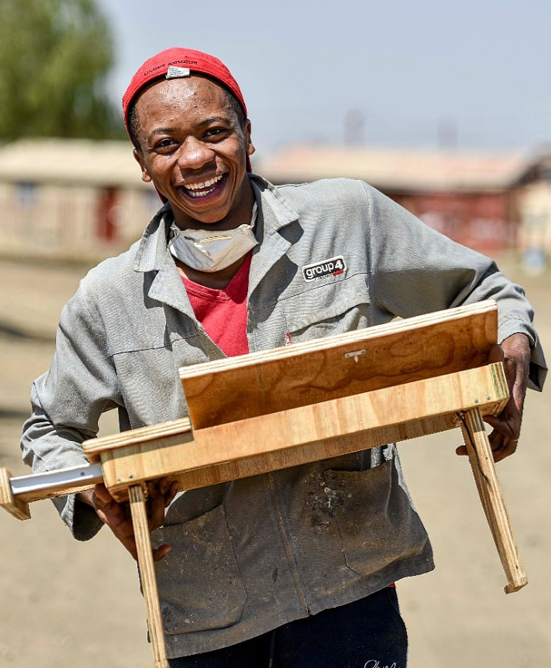
“I realised how much more convenient having a foldable laptop table would be. The birth of ThaPlanka started there.
"I decided that after writing exams, I would try to make one. I went on the internet to search for a circular saw and got one for R700,” he says.
After realising that making laptop stands and other products could be turned into a business, Shinners watched woodwork tutorials on YouTube. In August 2020, he started taking orders for desks. His product range also includes coffee tables and cup holders.
“I saw this as an opportunity because many people were working from home and students were learning online,” says Shinners.
When he started, Shinners used the penetration pricing strategy to attract customers – initially selling his products at a lower price. After establishing his customer base, he increased his prices to match his products’ value.
As he’s competing against major manufacturers, Shinners says he uses his art skills to colour his work. Customers can order the style and design they want, which makes his products unique.
While starting his business was not easy, Shinners was determined to succeed.
“When I started ThaPlanka I didn’t know how to operate a circular saw, angle grinder, jigsaw or other tools.
"I learnt how to operate them by watching tutorials online. I also created a table saw, using an old door and circular saw,” says Shinners.
His advice to others hoping to follow in his footsteps is to start with any resources they have, and use freely available online resources and learning sites to perfect their skills.
View Shinners’ work at www.thaplanka.co.za or search for ThaPlanka on social media.
Rostum Ogbuehi jams about jabs
Rostum Ogbuehi jams about jabs UrsulaUniversity of Pretoria (UP) student Rostum Ogbuehi has released a rap song encouraging people to get the Coronavirus Disease (COVID-19) vaccine and help save lives. 
The music video, which also dispels myths about COVID-19 vaccines, is making waves on the internet. It received 15 000 views within a week of being released.
The creative work was initiated by UP's Dean of the Faculty of Health Sciences, Professor Tiaan de Jager, following concerns about false information about COVID-19 vaccines. Ogbuehi used the information provided by the Professor Veronica Ueckermann, who is UP’s Acting Head of the Department of Infectious Diseases.
“Professor De Jager reached out to me to compose a song and video to aid with the promotion of vaccination. We worked with the faculty’s social media crew to produce the music video,” says Ogbuehi. He believes listeners will better connect with him through a visual representation of the song.
“The song alone is good by itself, but the icing on the cake was filming the music video. People need to see who the guy is that’s telling them to get vaccinated. Ultimately, I am trying to aid the promotion of vaccinating, through the university.”
Professor De Jager says he saw the need to bust the myths about the vaccine as they could hamper South Africa from reaching its vaccination targets.
“We have seen a low uptake in people getting vaccinated. This is concerning, as we know that COVID-19 vaccines reduce the risk of people getting the virus and can reduce the risk of spreading it,” he adds.
Ogbuehi, whose stage name is Ross the Boss, is a fifth-year medical student. The music video also features other students from the Faculty of Health Sciences, Vincent Mathenjwa and Tsholofelo Mphahlele, who are both studying medicine; and Reatlegile Mangope, who is studying oral hygiene.
“I understand the power of rap songs and that they can reach different age groups. I am very proud of our talented students who agreed to compose this unique rap song to contribute to the national and international drive to get people vaccinated,” says Professor de Jager.
To watch the music video, visit https://www.youtube.com/watch?v=G2QPkpq1Y6w
Vusumzi Mokoena brews success
Vusumzi Mokoena brews success vuyelwanAn entrepreneur is tasting sweet success with his Mavusana Premium Rooibos tea brand.
Vusumzi Mokoena (28) from Kayamandi in Stellenbosch in Western Cape has started selling his own blend of the world-renowned South African tea. 
Mokoena’s blend is made from the fynbos rooibos plants found in the Cape region.
“Mavusana brings a quality, raw, strong taste to the people at a very affordable price,” he explains.
The tea is manufactured with the assistance of local expert tea makers and is a hit with the community. Around 40 packets are sold a day in Stellenbosch alone, says Mokoena.
“Rooibos tea is loved by everyone, so we sell it to the members of our community, local retail outlets and those who place special orders. The sales from around Stellenbosch have been growing and the people are buying in their numbers.”
Mokoena said the main aim of his enterprise is to introduce a healthy, hot beverage to every household in South Africa, then to the world.
He adds that he is looking to grow the Mavusana Premium Rooibos brand in communities by getting young people to become distributors of the brand.
This, Mokoena believes, will help drive entrepreneurship and create employment opportunities in South Africa.
As the budding tea baron does not yet have a farm to grow his own tea, Mokoena sources his leaves from farms in the area that are already trading internationally. He then sends it off to a company that processes the tea to meet his high standards.
“I don’t have a factory yet or a farm, so I am working very closely with Cape Natural Tea Products. They process the tea according to our expectations and we test and taste the final product. Once that is done, we package the tea and sell it.”
Mavusana has created two job opportunities since Mokoena started in January.
For more information on purchasing Mavusana Premium Rooibos vist https://www.mavusana.co.za
Women-run farm excels despite COVID-19
Women-run farm excels despite COVID-19 vuyelwanGugulethu Farm in KwaZulu-Natal (KZN) is producing potatoes, broccoli, cauliflower, cabbage and spinach, thanks to government initiatives and support.
The KZN MEC of Agriculture and Rural Development, Bongiwe Sithole-Moloi, recently visited the Mooi River farm and commended the female farmers, who are excelling despite the Coronavirus pandemic. 
Gugulethu Farm is one of 896 farms, measuring 700 000 hectares of state land, that was underutilised or vacant. The land was claimed under government’s Land Reform Programme.
Gugulethu Community Trust spokesperson Sebenzile Dladla says families living on the farm asked seven women to form a committee and apply to the provincial government to use the land that was once a fully functional farm.
“We got the approval in 2008. As we were clueless about the management of a farm, even though we could work, we leased it out to commercial farmers with the hope that they would mentor us,” she says.
When the lease expired, the commercial farmers didn’t renew it and the women decided to work the land themselves.
At the time, they didn’t have working machinery. In 2018, they received funding from Potatoes SA and started farming potatoes on 18 hectares, using only their hands and domestic gardening tools.
In 2019, they received R3 million in funding from the KZN Department of Agriculture and Rural Development and have since expanded production to include broccoli, cauliflower, cabbage and spinach. They now use 70 hectares of the 345-hectare farm.
“We used part of the funding to fix machinery and facilities, including underground water pipes, the cold room and the centre-pivot for irrigation,” says Dladla.
The farm, which permanently employs 28 women, 14 men and some seasonal workers, supplies its produce to the Durban and Mkondeni fresh produce to markets, local supermarkets, Spar and Saverite Supermarket.
“We are happy to see people from our community and neighbouring areas coming to get jobs and being able to provide for their families, as most of the men in area left to find work,” says Dladla.
For funding and training opportunities, go to www.kzndard.gov.za